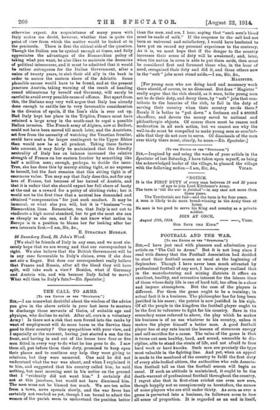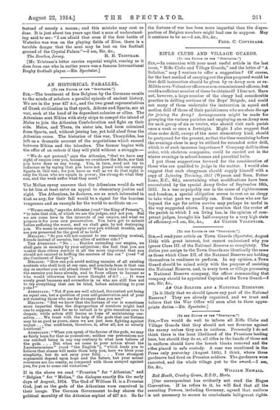FOOTBALL AND THE WAR,
[TO THE EDITOR Or TEE " SPECTATOR."] SIR,—I have just read with pleasure and admiration your article on " The Call to Arms." But it is not long since I read with dismay that the Football Association had decided to start their football season as usual at the beginning of September. Though I have never been much attracted by professional football of any sort, I have always realized that in the manufacturing and mining districts it offers an excellent, healthy, and recreative interest for the leisure time of those whose daily life is one of hard toil, too often in a close and impure atmosphere. But the case of the players is different. For them the game ought to be a training; in actual fact it is a business. The philosopher has for long been justified in his sneer; the patriot is now justified in his sigh. Of all the people in the kingdom the football player ought to be the first to volunteer to fight for his country. Save in the secondary sense referred to above, the play which he makes his business is of no use whatever to his country, unless it makes the player himself a better man. A good football player has at any rate learnt the lessons of strenuous energy and self-sacrifice for a cause. The value of the game is that it turns out men healthy, bard, and sound, amenable to dis- cipline, able to stand the strain of life, and not afraid to face hard work or hard knocks. Such men are precisely the type most valuable in the fighting line. And yet, when an appeal is made to the manhood of the country to fulfil the first duty of every able-bodied citizen, the authorities who rule Associa- tion football tell us that the football season will begin as usual. If such an attitude is maintained, it ought to be the death-warrant of professional football throughout the country. I regret also that in first-class cricket one even now sees, though happily not so conspicuously as heretofore, the names of some players who are still under thirty. As soon as ever a game is perverted into a business, its followers seem to lose all sense of proportion. It is regarded as an end in itself, instead of merely a means ; and this mistake may cost us dear. It is just about ten years ago that a man of understand- ing said to me : "I am afraid that even if the first battle of Waterloo was won on the playing fields of Eton, there is a terrible danger that the next may be lost on the football ground of the Crystal Palace."—I am, Sir, &c.,
[Mr. Tristram's letter carries especial weight, coming as it does from one who in earlier years was a famous International Rugby football player.—ED. Spectator.]



































 Previous page
Previous page